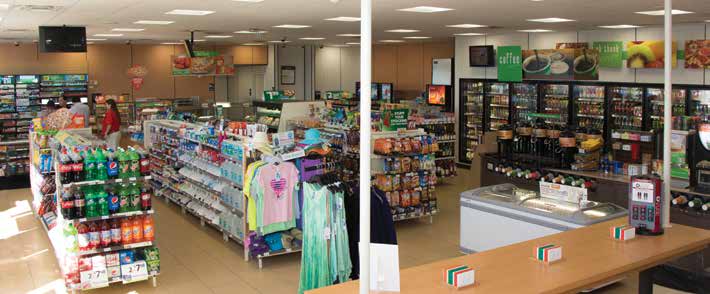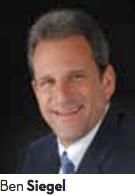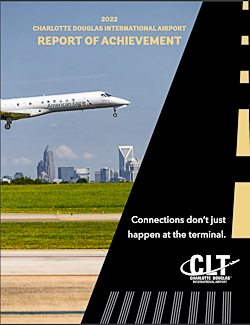Southwest Florida Int'l Opens Onsite Travel Plaza

When Southwest Florida International (RSW) opened a 24-hour gas station/convenience store last summer, it became the first airport in the state to offer a turnpike-style travel plaza. Strategically located between RSW's entrance and exit roads, the facility sits on land that Lee County Port Authority set aside for that very purpose when it modernized the Fort Meyers airport with a new terminal that opened in 2005.
Currently, the plaza includes a 12-pump Mobil gas station; a 7-Eleven convenience store, complete with a real-time flight information board; and a carwash used regularly by taxis and limousines serving the airport. The 3,000-square-foot building also has space for a quick-serve restaurant that is already in the works.
The $4 million facility was built and is operated by a private developer. RSW collects $15,400 per month in rent, plus 1 cent per gallon of fuel sold and 1% of the convenience store's annual sales over $1.5 million.
| factsfigures Project: On-Site Travel Plaza Location: Southwest Florida Int'l Airport (Fort Meyers) Main Components: 7-Eleven convenience store; Mobil gas station; carwash Impending Addition: Quick-serve restaurant Operator: PMG Airport Developers Initial Contract Terms: 25-yr lease with possible 10-yr extension; $15,400/month rent for 2.25 acres plus 1 cent/gal. of fuel sold & 1% of store's annual sales over $1.5 million Building Size: 3,000 sq. ft. PMG's Building Cost: $4 million Architect/Engineer: Eryou Engineering General Contractor: Aventura Construction Noteworthy Details: Convenience store includes a real-time flight information display; extra parking capacity was added to create new cellphone waiting lot; new interstate exit routes all inbound traffic past airport travel plaza |
"Given that the location is a very nice piece of property and centrally located, we were confident our revenue requirements would be met," says Ben Siegel, deputy executive director of administration at RSW.
The airport selected PMG Airport Developers to build the onsite travel plaza after receiving two responses to its 2010 request for proposals. Officials then negotiated a 25-year operating lease, with a possible 10-year extension. RSW began collecting rent and its slice of gas sales when the plaza opened last June; but it hadn't earned revenue from the convenience store as of March, because the 7-Eleven had not surpassed the $1.5 million sales threshold after nine months in operation.
"We are still in the ramp-up period," explains Neysan Rassekh, PMG's executive vice president for real estate development and finance. "A travel plaza like this typically takes about a year or more to reach maturity."
In addition to its location at RSW, the company operates travel plazas at New York's LaGuardia Airport and John F. Kennedy International; Washington Dulles International; and Indianapolis International. The company is also developing locations in Palm Beach and Cleveland, and is currently wrapping up lease negotiations for a plaza at Chicago's O'Hare International that will provide compressed natural gas as well as traditional gasoline. The firm is also finalizing terms with one other airport Rassekh prefers not to name.
"We look for airports where there is demand for the service, where national convenience stores want to go and where the land is right," he explains. "Fort Myers seemed to be an easy partner to work with."
PMG Airport Developers is a unit of Petroleum Marketing Group, which owns, operates or supplies more than 850 gas stations coupled with convenience stores in the U.S. Mid-Atlantic region.
 Ramping up Revenue
Ramping up Revenue
Advisors at AirProjects, an airport concessions consulting firm, consider onsite travel plazas an effective way for some airports to generate new revenue from unused land. Often, the sites are remote parcels with few other productive uses, and airports can attract significant capital investment from private sources by positioning them for concessions opportunities, explains Kent Vanden Oever, a director with the Virginia-based firm. In some cases, on-airport travel plazas capture business from travelers and employees alike, he adds.
The old real estate mantra - "location, location, location" - certainly applies to RSW's plaza, especially since the state of Florida opened a dedicated exit ramp off Interstate 75 for airport traffic. Previously, vehicles traveled surface streets to get to the airport, passing a variety of gas stations and convenience stores along the way. Now, all drivers using the exit pass directly by the airport's plaza, whether they are heading to the terminal or a parking facility.
RSW's new plaza is also the prime spot for customers to re-fuel rental cars before returning them at the airport, says Siegel, noting that the airport's contract requires PMG to keep its fuel prices within 5% of the local average. "They cannot raise prices to the point that customers may want to shop elsewhere," he explains.
Rassekh anticipates that the new exit ramp will increase the plaza's business by 20%.
Per its contract, PMG paid to build 75 extra parking spaces at the plaza to create a cellphone waiting lot for the airport. RSW maintains the lot and now provides a better experience for customers (its previous cellphone lot didn't have restrooms or concessions). The plaza operator, in turn, finds that cellphone lot users often gas up their vehicles or come into the store for a snack or drink while waiting for their riders.
Customers will soon have even more food and beverage options, as officials from PMG Airport Development are talking with national fast food restaurants about operating at the RSW plaza. "We expect to identify someone in the next six months," Rassekh noted in March.
Elsewhere, the company partners with Dunkin' Donuts, Burger King, Wendy's and Subway.

Family Resemblance
The travel plaza at RSW cost almost $1 million more to build than a similar non-airport facility, notes Rassekh. In addition to meeting county zoning codes, the plaza also had to meet the airport's design standards, he explains.
According to Siegel, PMG succeeded. The plaza looks and feels very similar to the terminal building, he comments.
"It does not look like a typical gas station," agrees Rassekh. "It looks like a natural extension of the airport. We strive to work with our airport locations to put in the architectural elements to make them unique to the local community, and that often takes a significant expense over a traditional gas station."
The company didn't encounter any major difficulties during construction, he reports. Utilities, in fact, were already in place near the building site, due to the port authority's foresight when constructing the airport terminal years earlier.
PMG Airport Developers worked with the airport to install directional signs throughout the area and markets the plaza to airport employees, rental car operators, local hotels and nearby residents.
2022 Charlotte Douglas International Airport Report of Achievement
 Giving back to the community is central to what Charlotte Douglas International Airport and its operator, the City of Charlotte Aviation Department, is about, and last year was no different.
Giving back to the community is central to what Charlotte Douglas International Airport and its operator, the City of Charlotte Aviation Department, is about, and last year was no different.
Throughout 2022, while recovering from the COVID-19 pandemic, we continued our efforts to have a positive impact on the Charlotte community. Of particular note, we spent the year sharing stories of how Connections Don't Just Happen at the Terminal - from creating homeownership and employment opportunities to supporting economic growth through small-business development and offering outreach programs to help residents understand the Airport better.
This whitepaper highlights the construction projects, initiatives, programs and events that validate Charlotte Douglas as a premier airport.
Download the whitepaper: 2022 Charlotte Douglas International Airport Report of Achievement.








